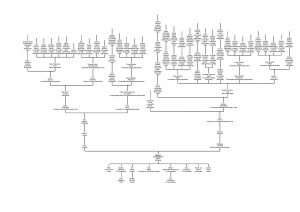QR Matters of Significance book free to download
PsyArXiv for the preprint of Children in War: https://osf.io/preprints/psyarxiv/qejzg_v1
Last updated: November 27, 2025
Google Scholar 251127: total citations 138.071, H-index 173; Web of Science 52.382 citations, H-index 114; ResearchGate 251127: total reads 716.859
UCL ranked in global top 10 for influential researchers _ UCL News – UCL – University College London
Ukrainian parents and children in wartime
From September 8 – 13, 2025 I visited colleagues in Kyiv, Dmytro Martsenkovskyi and Lesia Sak, both of the O.O. Bogomolets National Medical University, to work on papers and a book. On Friday September 12 I went to Lviv to discuss with Tetyana Nehrych and Alex Rakhman the PhD project of the latter at Danylo Halytsky Lviv National Medical University.
From April 21 – 26, 2025, Alla Shut of the O.O. Bogomolets National Medical University in Kyiv attended the training in Videofeedback to promote Positive Parenting – Sensitive Discipline (VIPP-SD) conducted by Jane Iles and Eloise Stevens at ISPA in Lisbon, Portugal, with a grant from the Beagle foundation in preparation of a VIPP-SD feasibility pilot coordinated by Lesia Sak of the O.O. Bogomolets university.
A Memorandum of Cooperation between the Danylo Halytsky Lviv National Medical University and Universidad San Sebastian, Chile was signed in March 2025.
From April 8 – 11, 2025 I conducted a meta-analysis workshop at the Danylo Halytsky Lviv National Medical University attended by Liliya Tsyhanyk, Yulia Bashynska, Alex Rakhman and Lesia Sak and visited the Children’s Mental Health Center at St. Nicholas Hospital with Tetyana Nehrych, Nataliia Chemeris and Liliia Tsyhanyk to discuss research plans.
In November 2024 I visited colleagues of the O.O. Bogomolets National Medical University in Kyiv and the Danylo Halytsky Lviv National Medical University to discuss plans for collaborative research on parents and children in wartime and to prepare for a pilot on acceptability and feasibility of the Video-feedback to promote Positive Parenting and Sensitive Discipline (VIPP-SD).
In May 2024 I visited Danylo Halytsky Lviv National Medical University to cooperate with LNMU faculty on burnout research in Ukrainian families and children in wartime.
Below a picture and an article about my visit in November 2023 to Kyiv in Ukraine where I gave some lectures and discussed ongoing research with faculty and students of the O.O. Bogomolets National Medical University.
Почесний професор Лондонського університету прочитав лекції у НМУ
Presentations on families and children in wartime Ukraine
Van IJzendoorn, M.H. (November 14-16, 2024). Invited talk on Attachment and trauma of parents and children in wartime. IVth Congress on Psychosomatic Medicine of the XXI Century: Realities and Prospects. Kyiv, Ukraine.
Van IJzendoorn, M.H. (October 26, 2024). Attachment and parents’ addiction to alcohol or drugs with focus on wartime Ukraine. Invited talk at the Second International Symposium: Dialogue on approaches to the treatment of addictions. Sigmund Freud Private University, Vienna, Austria.
Van IJzendoorn, M.H. & Sak, L. (July 15 2-3, 2024). (Chair). Mental health issues of families and children of Ukrainian soldiers and war veterans. Invited symposium at the International Attachment Conference, Rouen, France.
Van IJzendoorn, M.H. (May 3, 2024). Attachment and trauma from one generation to the next psychological and neurobiological perspectives. Presentation for faculty and students at Danylo Halytsky Lviv National Medical University, Lviv, Ukraine.
Van IJzendoorn, M.H. (November 15, 2023). Structural neglect of children growing up in institutions. Lecture at the Department of Medical Psychology, Psychosomatic Medicine and Psychotherapy. O.O. Bogomolets National Medical University, Kyiv, Ukraine.
Van IJzendoorn, M.H. (November 2-3, 2023). Intergenerational transmission of attachment and trauma. Psychological and neurobiological perspectives. VI Scientific and Practical Conference on “Psychosomatic Medicine: Science and Practice” of the Ukrainian Psychosomatic Medicine Association (UPMA). Online.
Publications on Ukraine in wartime
Bakermans-Kranenburg, M.J. & Van IJzendoorn, M.H. (2024). Family matters. Growing up in family-based care makes a world of a difference. Proceedings of the Shevchenko Scientific Society. Medical Sciences 2024,1(73). https-//doi.org/10.25040/ntsh
Ван Ієзендорн, М., Бакерманс-Краненбург, М., & Сак, Л. В. (2025). Прихильність у лікувальній комунікації між медичними працівниками та пацієнтами. У О. С. Чабан (ред.), Комунікативні навички лікаря (3-тє вид., переробл. та допов., с. 19–30). Київ, Україна: Видавничий дім «Медкнига».
[translated: Van IJzendoorn, M. H., Bakermans-Kranenburg, M. J., & Sak, L. V. (2025). Attachment in therapeutic communication between medical staff and patients. In O. S. Chaban (Ed.), Communication skills of the physician (3rd ed., revised and expanded, pp. 19–30). Kyiv, Ukraine: Medknyha Publishing House.]
Chemerys, N., LTsyhanyk, L., Bakermans-Kranenburg, M.J., Van IJzendoorn, M.H., & Nehrych, T. (2025, in press). Parenting Burnout in Wartime: Exploring Burnout in Ukrainian (Grand-)Mothers Two Years After the 2022 Russian Invasion. Journal of Family Trauma, Child Custody and Child Development.
__________________________________________________________
Highly Cited 2024 in the Psychiatry/ Psychology field ranking by Clarivate (Web of Science)
https://clarivate.com/highly-cited-researchers/?action=clv_hcr_members_filter&clv-paged=1&clv-category=&clv-institution=&clv-region=&clv-name=van%20ijzendoorn
Google Scholar 251127: total citations 138.071, H-index 173; Web of Science 241208: total citations 34.005; H = 113; PoP 241208: total citations 126.780, H=166; ResearchGate 251127: total reads 716.859
Societal impact: Quantitative estimate in Sage Policy Profiles
1051 citations across 766 policy documents in more than 30 countries (250306)
https://policyprofiles.sagepub.com/dashboard
___________________________________________________________
Our book Matters of Significance is published!
we are happy to announce the publication of our book on Matters of Significance. Replication, Translation and Academic Freedom in Developmental Science by UCL Press (London, UK).
The book is really fully Open Access and can be downloaded for free at the UCL Press website
https://www.uclpress.co.uk/products/234011
Of course the book can also be ordered as paperback or hardcover.
At the IAC in Rouen and the ISSBD in Lisbon the book with be discussed with a panel of experts and with the audience.
Below you find a brief description of the major themes.
We hope you enjoy reading the book!
From the website of UCL Press:
Application of scientific findings to effective practice and informed policymaking is an aspiration for much research in the biomedical, behavioural, and developmental sciences. But too often translations of science to practice are conceptually narrow, ethically underspecified, and developed quickly as salves to an urgent problem. For developmental science, widely implemented parenting interventions are prime examples of technical translations from knowledge about the causes of children’s mental distress. Aiming to support family relationships and facilitate adaptive child development, these programmes are rushed through when the scientific findings on which they are based remain contested and without ethical grounding of their aims.
In Matters of Significance, Marinus van IJzendoorn and Marian Bakermans-Kranenburg draw on 40 years of experience with theoretical, empirical, meta-analytic and translational work in child development research to highlight the complex relations between replication, translation and academic freedom. They argue that challenging fake facts promulgated by under-replicated and under-powered studies is a critical type of translation beyond technical applications. Such challenges can, in the highlighted field of attachment and emotion regulation research, bust popular myths about the decisive role of genes, hormones, or the brain on parenting and child development, with a balancing impact for practice and policymaking. The authors argue that academic freedom from interference by pressure groups, stakeholders, funders, or university administrators in the core stages of research is a necessary but besieged condition for adversarial research and myth busting.
What others wrote about Matters of Significance
‘This thoughtful volume is an accessible overview of the authors’ field-shaping collaborative research on attachment and an indispensable primer on differentiating between sense and nonsense in the service of producing cumulative developmental science and ethically translating its core insights.’ Glenn I. Roisman, University of Minnesota
‘The truly original arguments presented in Matters of Significance go beyond attachment, as they concern the nature of developmental science and its relation to ethical, cultural, legal and political issues.’ Jay Belsky, University of California, Davis
‘In a series of self-contained chapters, the authors provide far-ranging and accessible summaries of their decades of important research on key aspects of child-parent attachment and its replicable correlates, and close with a highly personal discussion of the politicization of science and its fraught relationship with academic freedom.’ Sarah Blaffer Hrdy, University of California at Davis
‘Attachment researchers are fortunate that their work generates so much enthusiasm among practitioners. Sometimes, though, enthusiasm has its drawbacks. In this appropriately provocative book, the authors draw from their remarkable scientific culture to caution against premature translation of research findings and advocate, instead, for what they nicely label “slow science” ‘. Annie Bernier, University of Montreal
‘Matters of Significance offers an accessible introduction to and summation of the authors’ decades of tremendous empirical and theoretical work. The book topples widespread myths about child development and offers a challenging commentary on a changing academic world, developing an account of the position of science within democratic societies.’ Robbie Duschinsky, University of Cambridge
“Matters of Significance” is beautifully written. The authors leverage their impressive research to challenge current knowledge, research practices, and translational efforts, while simultaneously charting a path forward that encourages debate, collaboration, and rigorous research. Ashley Groh (University of Missouri)
“With this insightful book, authors build on their scientific journey to illustrate how academic freedom is essential to produce and translate scientific knowledge into ethical, impactful policies and practices. A must-have for all students, researchers, practitioners, policymakers, and stakeholders who have at heart scientific progress and best clinical practices.” Chantal Cyr (Université du Québec à Montréal)
“In a series of self-contained chapters, the authors provide far-ranging and accessible summaries of their decades of important research on key aspects of child-parent attachment and its replicable correlates, and close with a highly personal discussion of the politicization of science and its fraught relationship with academic freedom.” Michael Lamb (University of Cambridge)
“This is a truly outstanding book by two of the world’s leading developmental scientists. They tackle the crucial areas around attachment theory science, practice and policy with scrupulous care. They sift the evidence carefully to arrive at thoughtful, nuanced conclusions. This is an essential read for anybody interested in contemporary evidence around attachment theory, written by two brilliant developmental scientists.” Alan Stein (Oxford University)
“Aristotelian is the first word I come to think of. Composed by two of the master minds of developmental science, this book tackles key matters of human development with remarkable clarity, nuance, and wisdom. It is scholarly work at its best, a tour de force if ever there was one. The book is a must-read for all aspiring developmental scientists, and highly recommended for anyone brave enough to take on contemporary academia with an unwavering commitment to the principles of enlightenment.” Pehr Granqvist (Stockholm University)
“Van IJzendoorn and Bakermans-Kranenburg are renowned for their rigorous and meticulous approach in attachment research. They have produced a timely and sophisticated contribution navigating the delicate ethical path in developmental science between the scientific description of ‘what is’ and the prescription of ‘what ought to be’. Drawing on examples accumulated from 40 years of painstaking research, this book offers important messages not only for developmental researchers and policy makers but for the future of the academy.” Andrew Lewis (Federation University Australia)
“Two towering figures in attachment theory, research, and translation into practice, Marinus Van IJzendoorn and Marian J. Bakermans-Kranenburg, reflect on their decades-long work and its scientific and social implications. Through various examples, they show how academia is becoming the new “impossible profession,” under siege by the left, the right, devious administrators, commercial interests, overcautious publishers, and sometimes even the academics self-censuring themselves and deviating from their duty to pursue untrammeled knowledge and understanding. The call by the authors for an honest and forthright discussion of these matters should reverberate well beyond their own areas of expertise.” Etzel Cardeña (Lund University)
“Matters of Significance is a tour de force in considering the past, present, and future of developmental science. Van IJzendoorn and Bakermans-Kranenburg excel in leveraging their decades of experience in highlighting the critical importance of replicability of research findings, ensuring their appropriate translation to practice in supporting children and families. Matters of Significance should be required reading for developmental scientists at any stage of their career.” Helena Rutherford (Yale)
__________________________________________
_________________________________________
UCL academics recognised in annual global list of influential researchers, 16 November 2023
https://www.ucl.ac.uk/news/2023/nov/ucl-academics-recognised-annual-global-list-influential-researchers
Psychiatry and Psychology: Chris R. Brewin, Karl J. Friston, Glyn Lewis, William Mandy, Susan Michie, Andrew Steptoe, Marinus H. van IJzendoorn
_______________________________________
Aim of the personal website
This website is about scientific work conducted on the intriguing puzzle of parenting and its influence on child development in the era of the genome and the brain. The ‘Dutch Blog‘ and ‘Nieuws‘ are in the Dutch language, as these are notes pertaining to local issues.
The banner is part of a winter landscape painted by Hendrick Avercamp (1585 – 1634), in fond memory of three wonderful Frisian Eleven Cities Skating Tours (Elfstedentochten).
———————————————————————————————————-
Main affiliations
Honorary Professor at the Research Department of Clinical, Educational and Health Psychology, Division Psychology and Language Sciences, Faculty of Brain Sciences, UCL, London, UK.
Adjunct Professor at the Department of Psychiatry, Faculty of Medicine Nursing and Health Sciences, Monash University, Melbourne, Australia
Profesor titular (parttime) at the Faculty of Psychology and Humanities, Universidad San Sebastian, Santiago/ Valdivia, Chile
E-mail addresses
primary e-mail: marinusvanijzendoorn@gmail.com;
UCL email: ucjumv2@ucl.ac.uk
secondary emails: Marinus.vanIJzendoorn@monash.edu
Websites of studies with Marinus’ involvement
L-CID study:
https://readymag.com/u21932671/cid2019-2020/lcid_profile/
Generation R study:
https://www.erasmusmc.nl/en/research/core-facilities/generation-r
Father Trials study:
https://cordis.europa.eu/project/id/669249
Mercy Pregnancy Emotional Wellbeing Study: https://www.monash.edu/medicine/scs/researchers/megan-galbally
Publications
Google Scholar:
https://scholar.google.ca/citations?user=Z47xzgEAAAAJ&hl=en
ResearchGate:
https://www.researchgate.net/profile/Marinus_Van_IJzendoorn
ORCID:
https://orcid.org/0000-0003-1144-454X
UCL profile: https://www.ucl.ac.uk/psychoanalysis/people/marinus-van-ijzendoorn
Valorisation
www.lollenautafoundation.eu
https://transformcare4children.org/home
———————————————————————————————————-
Sitting in the shadow of the statue of Charles Darwin in the garden of Christ’s College in Cambridge as a reminder of his immense courage and brilliant contributions
Darwin suffered from ‘bad hair days’, see Darwin quote:
 Marinus van IJzendoorn studies the social, psychological and neurobiological determinants of parenting and child development, with special emphasis on attachment, emotion regulation, differential susceptibility, and child maltreatment. Central question is whether and how parents and other caregivers shape children’s development in the current era of the genome and the brain.
Marinus van IJzendoorn studies the social, psychological and neurobiological determinants of parenting and child development, with special emphasis on attachment, emotion regulation, differential susceptibility, and child maltreatment. Central question is whether and how parents and other caregivers shape children’s development in the current era of the genome and the brain.
His research was part of PEARL –Program for Emotion regulation and Attachment Research in Leiden, the research program of the Centre for Child and Family Studies at Leiden University, the Netherlands. PEARL has been dissolved by the end of 2017, after decades of productive collaborative work with a large and enthusiastic team of colleagues and co-workers. Alan Sroufe evaluated PEARL in June 2016 as follows: “This is an extraordinary program. The team is highly productive, and the cutting edge research being carried out is of the highest quality.”
At Leiden University Marinus is a Professor Emeritus (since his obligatory retirement age for his age cohort in the Netherlands) but he continued to be involved in several Leiden research programs, among others the Leiden Consortium for Individual Development (L-CID; since May 2018 as Scientific Consultant, until the end of this wonderful research program in October 2023), 3G Family Lab, and Father Trials (directed by Marian Bakermans-Kranenburg, now moved to the ISPA – University Institute of Psychological, Social and Life Sciences, Lisbon, Portugal).
(See website).
(See website).
(See website).
At Erasmus University Rotterdam he retired as a professor of human development in the Department of Psychology, Education, and Child Studies (DPECS) (See website) and became a visiting professor in the same department until May 2024. He was one of the PIs of Generation R (See website). (See website). He left the Erasmus University Rotterdam as an emeritus with a valedictory lecture on May 12, 2023.
From October 1, 2017 to October 1 2020, he was a Honorary Senior Visiting Fellow, Department of Public Health and Primary Care, School of Clinical Medicine, University of Cambridge, UK, and in 2019 he was a Visiting Fellow at Sidney Sussex College founded by Lady Frances Sidney, with the saying ‘Dieu me Garde de Calomnie’ (Lady Frances Sidney, Countess of Sussex,1531–1589).
From 2018 to 2022 he was a visiting professor of human development at the School of Psychology, Capital Normal University, Beijing, China. He taught courses for faculty, MA and PhD students on meta-analysis of human development research and on child socio-emotional development, and was a scientific advisor for child development research.
From November 1 2020 to November 1 2027 he is appointed honorary professor at the Research Department of Clinical, Educational and Health Psychology, Division on Psychology and Language Sciences, Faculty of Brain Sciences, UCL, University of London, London, UK.
From June 1, 2022 he became a Monash University Affiliate at Psychiatry Monash Health, Monash University, Melbourne, Australia, to work with professor Megan Galbally and her team. This was updated to an Adjunct Professor position for 5 years (2023-2028 D.V.)
In October 2022 he was a visiting professor at the University of Trento, Department of Psychology and Cognitive Science.
On April 1 2024 he was appointed as parttime profesor titular at the Faculty of Psychology and the Humanities of the Universidad San Sebastian, Santiago/Valdivia, Chile, to help developing a Graduate Program in Psychology and Mental Health.
More than 15 years ago Adriana Bus and Marinus van IJzendoorn started the Lolle Nauta Foundation to work with African faculty and students in the area of education, developmental psychology and family studies. Ten African students were successfully supported in conducting their PhD studies.
In 2018 a small company Beagle Advice, Research and Development started in the domain of parenting and child development.
Scientific genealogy going back to von Gudde, von Goethe, and William of Ockham 🙂



